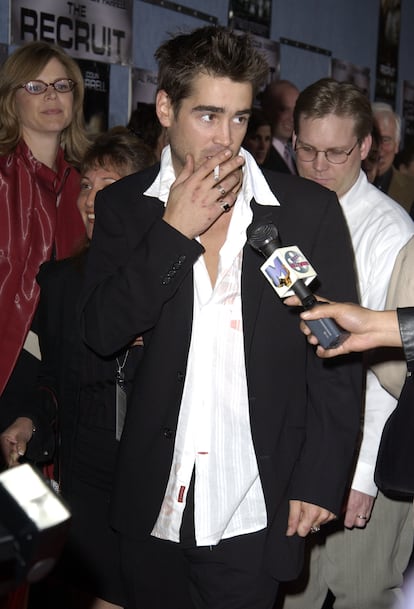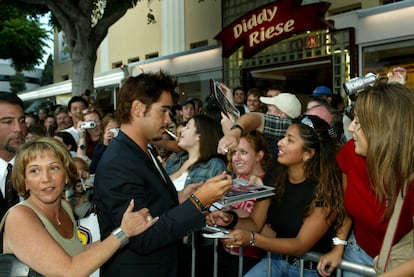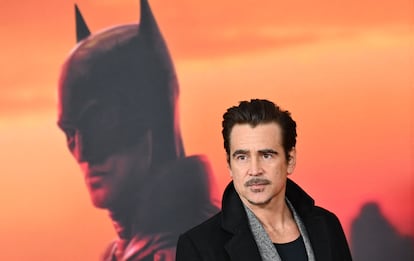Colin Farrell: How Hollywood’s last bad boy lost his way
The Irish actor’s role as The Penguin in ‘The Batman’ has won him his own HBO series. The sex symbol of the 2000s is back as a supporting actor after decades of alcohol and isolation

At the 2003 Academy Awards ceremony, Colin Farrell took the stage to introduce the band U2. The actor had been in Hollywood for a few years, and Steve Martin, the night’s host, ticked off his achievements: he was the man of the hour; he’d appeared shirtless on all the hot magazine covers; he alternated between prestige projects and blockbusters; and he dated a steady stream of models. “In other words, next stop, rehab,” Martin joked. Two years later, Farrell would fulfill that prophecy.
On his way to stardom, Farrell had been marketed as “Hollywood’s bad boy,” but the actor took the role too far. “I couldn’t find the handbrake,” he would say years later. Today he has been sober for 16 years. He is the father of two children, and he shone as The Penguin in The Batman. He has given up his stardom, which Hollywood eagerly thrust on him but he never quite bought into, to play brilliant supporting roles.
In the late 1990s, Farrell played an autistic teenager in a play in London. At the end of one of the performances, the actor Kevin Spacey greeted the young Irishman and offered his congratulations. The veteran star bought his younger counterpart a beer and promised to turn Farrell into a star, first by putting him in touch with the CAA, the most powerful agency in Hollywood.

Farrell made his Hollywood debut with Tigerland. The marketing machine took off in full force. The Colin Farrell product began as a twist on familiar flavors. Vanity Fair called him “the Irish Brad Bitt.” “Very soon, Colin Farrell will elicit comparisons to James Dean and the young Robert De Niro,” gushed Interview. ABC described him as “Steve McQueen-like.” His director Joel Schumacher, who took Spacey’s place as Farrell’s mentor, compared him with “Paul Newman from Cool Hand Luke or Jack Nicholson in One Flew Over the Cuckoo’s Nest.”
Hollywood took the bait. Despite being unknown to the general public, Farrell won roles that had been written for A-list stars like Edward Norton, Jim Carrey and Matt Damon in Hart’s War, Phone Booth and Minority Report, respectively. Overnight, he became the most famous nobody in the world. One day, the actor tested Spielberg’s patience on the set of Minority Report. He showed up so drunk to the shoot that it took him 34 takes to say the sentence “I’m sure you’ve all grasped the fundamental paradoxical pre-crime methodology.” (In some retellings of the story, the number has risen to 56 takes.)
In every interview, Farrell recited an origin story that seems taken from a work by Irish playwright Sean O’Casey. He spent his childhood dreaming about becoming a professional soccer player like his father, until he discovered beer, tobacco and fighting. He was expelled from several schools and eventually dropped out. Acting saved him.

In reality, Farrell came from an upper-middle-class family that lived in a million-euro home in one of Dublin’s most exclusive neighborhoods. He had attended the city’s best schools and was expelled from none, at least according to one of his childhood best friends, Gavin Lambe-Murphy, who clarified that Farrell had been suspended for four days for throwing erasers in class. In a Vanity Fair article, even the actor’s own brother, Eamon, expressed surprise about the working-class accent that Colin had developed since moving to Los Angeles.
And Farrell hadn’t come to acting by accident as he claimed. In 1993, at 17 years old, he attended an audition for the boy band Boyzone. The rejection, as he would later confess, pushed him into his first drug spiral. “I ended up on a shrink’s couch and he told me to write down how much I did in a week. Twenty E’s, four grams of coke, six of speed, half an ounce of hash, three bottles of Jack Daniels, 12 bottles of red wine, 60 pints and 280 fags. He looked at me and said: ‘No wonder you’re depressed.’”
It may have been true, or it may have been an exaggeration. Colin Farrell worked to satisfy the fantasy of a working-class Irishman that Hollywood had put on his soldiers. He started making scandalous statements about, for instance, female intimate hair removal. (“I eat a lot of pussy [in Ireland], but I never saw a vagina until I came [to Los Angeles]”), about his fondness for prostitutes (“It’s like ordering a fucking pizza”), about his drug consumption (“Heroin is good in moderation”) and about the day he told the actress Linda Fiorentino that as a teenager, he used to masturbate to her films.

“I was at the party with 20 people, one of them an agent from CAA, when somehow the subject of foreskins came up,” Farrell told Playboy. “She said, ‘I just don’t understand a foreskin. I’ve never seen one.’ So I whipped out my dick and said, ‘Here, that’s all it is. A bit of skin.’ I did a little Puppetry of the Penis thing and showed her what it was about. You would have thought she was at a circus the way she was looking at me.”
Media coverage from the era described the actor’s effect on women, whether journalists, makeup artists or executives. A GQ article recounted that during the interview, a woman had approached Farrell and begun stroking his crotch. At the premiere of The Recruit (2003), he French-kissed a reporter who was interviewing him on the red carpet.
The magazine Details showed Farrell on its cover with the title “Have you slept with Colin Farrell yet?” In 2003, Farrell married a British actor who he divorced four months later. But his greatest love of that era was Elizabeth Taylor, with whom he maintained a platonic relationship until her death in 2013.
He was 34. She was 75. “I wanted to be [husband] number eight, but we ran out of road,” he confessed in a conversation with Ellen DeGeneres. They met in the Cedars-Sinai hospital as she was recovering from heart surgery and he was visiting his newborn son. “I loved her. I still care for her,” the actor told ICON in 2016. “We talked about everything. Reality TV, food, travel…not so much about the film world. Both of us were insomniacs, and we would talk about poetry until the wee hours.”
The press described Farrell’s flings with Demi Moore, Carmen Electra and Britney Spears, in addition to a long list of anonymous models and Playboy bunnies. One of them, Nicole Narain, appeared with Farrell in a sex tape whose viewers outnumbered those of any of hs films. The journalist Stephanie Zacharek called it “remarkably unsleazy” and the actor’s enthusiasm as “nothing but gentlemanly.”
Hollywood had never had a bad boy with such good manners. For someone defined as “a man of spectacular excess,” a “hooligan,” a “sexual maniac” and “a budding obituary,” Farrell has a fairly clean trajectory. He never got into bar fights, made trouble on set or even got arrested for drunk driving. Everything known about his wild lifestyle comes from his own confessions.

When Alexander premiered in 2004, Colin Farrell was Hollywood’s favorite joke. “People seem to think of Farrell as a celebrity who just happens to get movie roles,” Stephanie Zacharek wrote. His salary reached €10 million despite never having a commercial streak. The bubble of his fame, artificially inflated by the marketing machine, was about to burst: Farrell became more famous for his disasters than for his successes.
“Don’t you just want to punch Colin Farrell?” asked an Esquire cover that featured the actor’s photo. The tough guy had turned into a seedy character, even a slimeball. During the filming of The New World (2005), in which Farrell played colonizer John Smith, the actress who played Pocahontas, Q’Orianka Kilcher, expressed her reservations about filming romantic scenes with the actor due to his reputation. Terrence Malick had to re-record certain scenes because the studio’s lawyers were afraid to have broken laws against child pornography.
Critics of Alexander (2004) seized on Farrell. The actor decided to hide away in a cabin on Lake Tahoe. Sheathed in a balaclava so no one would recognize him, the actor recounts that he let loose his compulsive drug habit. “Eighty to 90% [of the reviews were] negative, and 30 to 40% vicious. Like, so personally insulting. But I read them all,” the actor confessed to GQ in 2008. “I was probably looking to confirm particular suspicions that I had of myself. Like I shouldn’t be here. Why do I have this career? I can’t do this. I’m not worthy.”

The day that filming ended on his following movie, Miami Vice (2006), while the rest of the team attended the wrap party, Farrell traveled to Crossroads, the rehab center founded by Eric Clapton. “I didn’t want to die, but I didn’t want to live either,” he later explained. When he attended the Miami Vice premiere, he confessed not remembering any of the filming.
A couple of years later, in 2008, Farrell found himself in the limelight once again. He had found peace in New York’s Turkish baths. The new Colin Farrell did yoga, appeared on the cover of Men’s Health and became the face of a Dolce & Gabbana fragrance. “Literally the worst thing I’ve done in the last eight years is sneak a fucking sandwich into the cinema that was not bought on the property,” he joked. A Golden Globe for the black comedy In Bruges (2008) crowned the actor’s triumphal return.
Since then, Farrell has found his niche in art films, including Seven Psychopaths (2012), The Lobster (2015), The Beguiled (2017) and the science fiction drama After Yang (2021), which received outstanding reviews. And with the exception of the disappointing remake of Total Recall in 2012, his forays into commercial cinema have been limited to secondary roles: Fantastic Beasts and Where to Find Them (2016), Dumbo (2019) and now The Batman.
In 2018, he entered rehab once again because, according to an official statement, he felt tempted to relapse under the pressure of work. But now his only addiction is nature and spending time with his children, 18-year-old Jimmy, who suffers from a rare chronic illness that prevents him from walking and talking, and 12-year-old Henry. Neither of the two are aware that their father was a global sex symbol. And, Farrell adds, when he goes hiking with the family, the boys make fun of his shorts.
Tu suscripción se está usando en otro dispositivo
¿Quieres añadir otro usuario a tu suscripción?
Si continúas leyendo en este dispositivo, no se podrá leer en el otro.
FlechaTu suscripción se está usando en otro dispositivo y solo puedes acceder a EL PAÍS desde un dispositivo a la vez.
Si quieres compartir tu cuenta, cambia tu suscripción a la modalidad Premium, así podrás añadir otro usuario. Cada uno accederá con su propia cuenta de email, lo que os permitirá personalizar vuestra experiencia en EL PAÍS.
¿Tienes una suscripción de empresa? Accede aquí para contratar más cuentas.
En el caso de no saber quién está usando tu cuenta, te recomendamos cambiar tu contraseña aquí.
Si decides continuar compartiendo tu cuenta, este mensaje se mostrará en tu dispositivo y en el de la otra persona que está usando tu cuenta de forma indefinida, afectando a tu experiencia de lectura. Puedes consultar aquí los términos y condiciones de la suscripción digital.








































